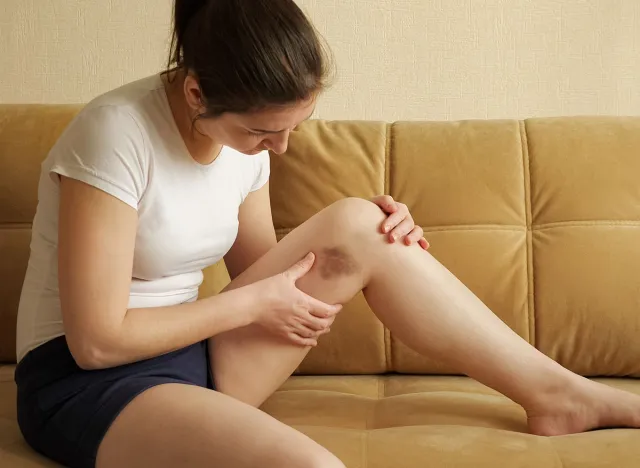Top 9 Vitamin Deficiencies and How to Spot Them

Are you deficient in essential vitamins? "There are many telltale signs of vitamin and mineral deficiencies," Patricia Graham, MD, tells RUSH University Medical Center. "But the good news is that often, if you take steps to address the deficiency, the symptoms will either improve or go away altogether. Communicating your concerns with your primary care doctor is essential. That way, we can check out your issue and reverse the problems early on. Often, the treatment for these deficiencies is fairly simple, so the key is identifying them." Here are the top 9 vitamin deficiencies and how to spot them.
Vitamin Deficiency Anemia

Vitamin deficiency anemia can cause dizziness and fatigue. "Vitamin deficiency anemia is a lack of healthy red blood cells caused by lower than usual amounts of vitamin B-12 and folate," says the Mayo Clinic. "Symptoms can include fatigue, shortness of breath and dizziness. Vitamin supplements, taken by pill or injection, can correct the deficiencies."
Calcium Deficiency

If you feel constant aches and pains in your bones or trouble with chest pains, you may have a calcium deficiency. "Calcium regulates your heartbeat," Dr. Graham says. "So a deficiency could cause an arrhythmia, or irregular heartbeat, and even lead to chest pains."
Vitamin D Deficiency

Vitamin D deficiency can cause both physical and mental issues. "When vitamin D levels are low, and the body isn't able to properly absorb calcium and phosphorus, there is an increased risk of bone pain, bone fractures, muscle pain, and muscle weakness," according to Yale Medicine. "In older adults, severe vitamin D deficiency (levels less than 10 ng/mL) may also contribute to an increased risk of falls."
Vitamin A Deficiency

Vitamin A deficiency can cause sight issues. "A lack of vitamin A causes the cornea to become dry and that makes the eyes cloudy and can lead to vision loss," Dr. Graham says. "It can also damage your retina."
Vitamin B12 Deficiency

Are you dealing with constant fatigue and memory issues? You may have a B12 deficiency. "Signs of a B12 shortfall include fatigue from anemia; numbness in hands, legs, and feet; or trouble with balance and walking," says Harvard Health. "Memory can also suffer. Vitamin B12 is readily found in fish, chicken, milk, and yogurt. If you prefer plant-based options, try fortified non-dairy milks and cereals. Adults need 2.4 micrograms of B12 each day."
RELATED: These Ultra-processed Foods May Be Shortening Your Life, According to New Study
Iron Deficiency

Iron deficiency is more likely to be common in women. "If you're low on iron, you may feel cold, tired, or short of breath," says Harvard Health. "You may have headaches more frequently. Meat and seafood typically offer plenty of iron, and plant-based sources include beans, lentils, grains, spinach, and fortified cereals. Women over 50 need 8 milligrams (mg) of iron per day; younger women, 18 mg daily."
Vitamin C Deficiency

Vitamin C deficiency can cause unexplained bruising. "Severe vitamin C deficiency can lead to a disease called scurvy, which causes anemia, bleeding gums, bruising and poor wound healing," says the Mayo Clinic. "If you take vitamin C for its antioxidant properties, keep in mind that the supplement might not offer the same benefits as naturally occurring antioxidants in food. The recommended daily amount of vitamin C is 90 milligrams for adult men and 75 milligrams for adult women."
Vitamin B7 Deficiency

A lack of vitamin B7, known as Biotin, can cause fatigue and hair and skin issues. "Deficiency may lead to neurological symptoms, including numbness, tingling, and muscle cramps," says Narayana Health. Some individuals may experience cognitive issues, such as mental confusion or mild depression."
RELATED: How to Eat to Lose Belly Fat in 3 Simple Stages
Low Potassium

Symptoms of low potassium may include fatigue, muscle cramps, weakness, and constipation. "Abnormal heart rhythms (arrhythmias) are the most worrisome complication of very low potassium levels, particularly in people with underlying heart disease," says the Mayo Clinic. "Treatment of low potassium is directed at the underlying cause and may include potassium supplements. Don't start taking potassium supplements without talking to your doctor first." And if you enjoyed this article, don't miss these 20 Superfoods for People Over 50.




